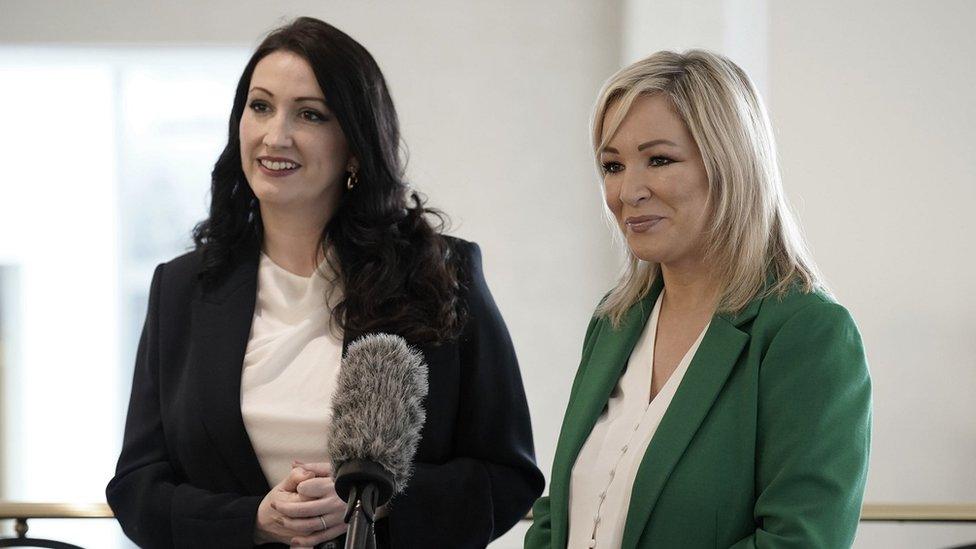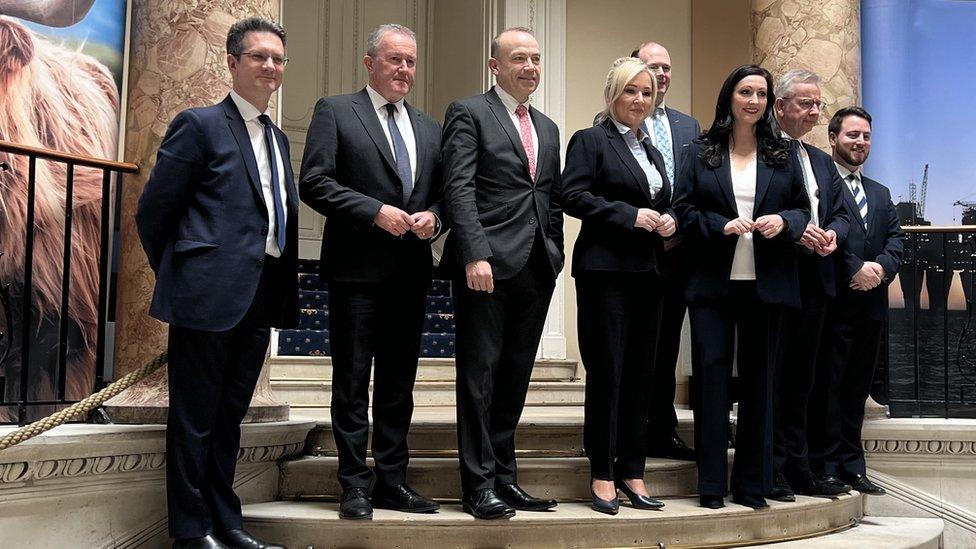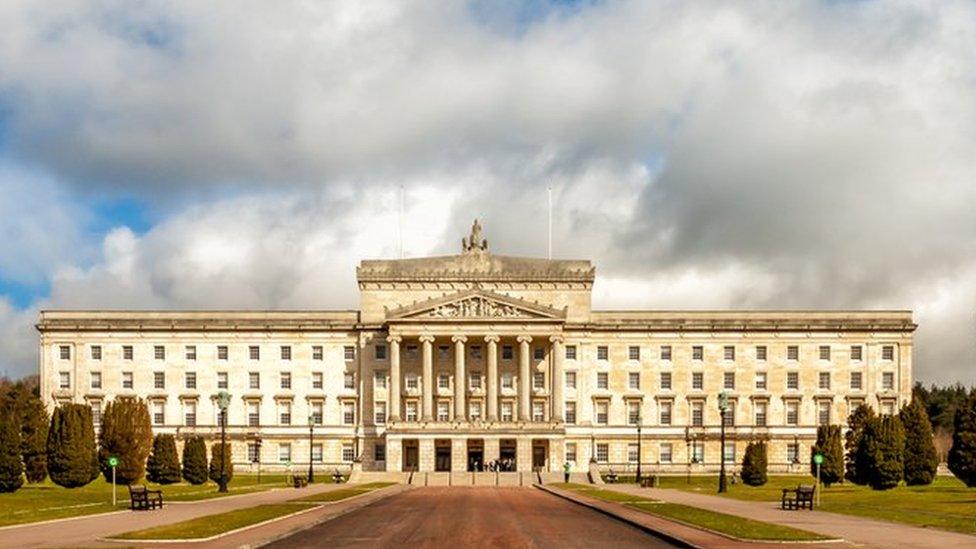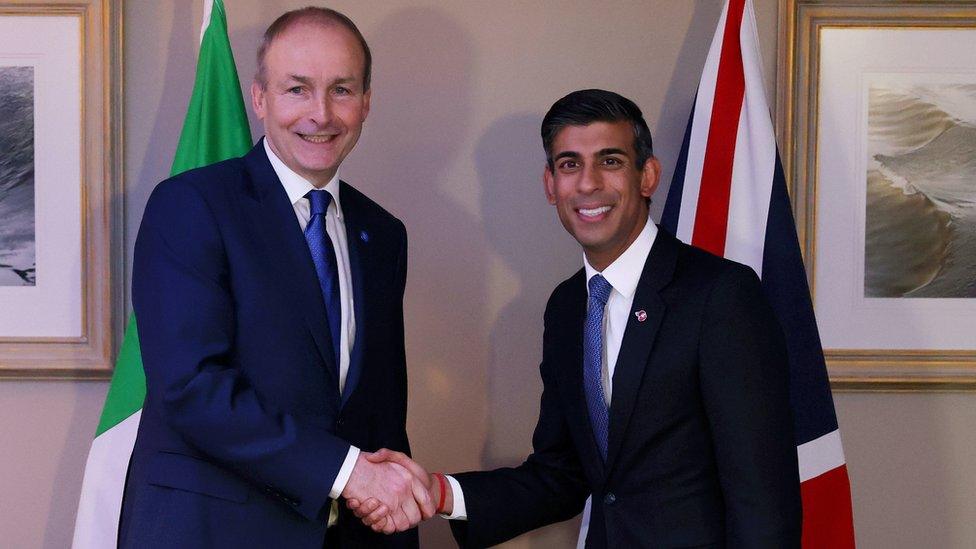New UK East-West Council meets for the first time
- Published

Emma Little-Pengelly and Michelle O'Neill will attend the summit, as well as ministers from the government
The first meeting of the new UK East-West Council has taken place in London.
The UK government agreed to set up the council, external as part of its deal with the Democratic Unionist Party (DUP) that saw it return to Stormont.
Stormont's first and deputy first ministers attended the summit, along with ministers from the UK government.
Its purpose is to look at ways of deepening links between Northern Ireland and Great Britain.
Another body, Intertrade UK, was also formed as part of the deal to promote two-way trade between Northern Ireland and GB.
One of the outcomes of Tuesday's meeting was the announcement of about £17m for two projects from the UK Shared Prosperity Fund.
An award of £5.9m will go towards improving adult numeracy and a further £11.2m will go towards business innovation in Northern Ireland.
What will the new council do?
The government said the council would have four initial missions including:
Sharing "best practice" between GB and NI on economic inactivity and offering advisory support to implement "major projects"
Recommending interventions on east-west investment and assessing existing funding and investment strategies
Improving international investment to Northern Ireland
Bolstering east-west connectivity
Who was there?
Ministers from the Stormont Executive took part alongside politicians from the UK government.
The first and deputy first ministers attended with Economy Minister Conor Murphy and Communities Minister Gordon Lyons.
Prime Minister Rishi Sunak did take part.

Ministers gathered for the meeting at the Scotland Office in London
First Minister Michelle O'Neill described Tuesday's meeting as a "useful engagement", adding that intergovernmental arrangements were "crucially important".
"Any forum that allows us to have those opportunities, then I think is always going to be something that we should take up."
The Sinn Féin deputy leader said the council operated as a "forum in which we can improve relations", but it did not have the statutory powers" of cross-border bodies established under the Good Friday Agreement.
Deputy First Minister Emma Little-Pengelly said the new body was "not a threat to anybody" as she denied it was an attempt to bypass cross-border bodies established under the Good Friday Agreement.
She said the institutions under the 1998 peace agreement persisted, with meetings planned in the coming months of the North-South Ministerial Council and the British-Irish Council.
The DUP assembly member said the new East-West Council "complements and supplements what's there".
'Not a talking shop'
Levelling Up Secretary Michael Gove represented the Westminster government, along with Chris Heaton-Harris and Steve Baker from the Northern Ireland Office.
Speaking after the first meeting, Northern Ireland Secretary Mr Heaton-Harris denied the council was "another talking shop".
He said the meeting looked at ways to "strengthen the bonds" between Northern Ireland and Great Britain.
"This was needed. This is going to help in a whole host of ways, from exchanges through culture and skills, to making sure that business flows are helped," he said.
Mr Gove said there was a "fruitful discussion in which we outlined our approach towards supporting the executive in the priorities which it set for itself".
He said the meeting had "tangible gains", such as discussions on the targeting of funding streams and plans to set up a new body called Intertrade UK.

What do the different bodies do?
The East-West Council
Remit to examine "enhancing connections" between the different parts of the UK on areas such as trade, education and culture
Intertrade UK
Also formed as part of the UK government's deal with the DUP
Aims to promote two-way trade between Northern Ireland and Great Britain, providing advice and facilitating businesses across the UK in "boosting internal trade"
There are other bodies already established under the Good Friday Agreement that deal with east-west links.
The North-South Ministerial Council (NSMC)
Involves ministers from Dublin and Stormont on "matters of mutual interest"
Covers six areas of co-operation: Agriculture, education, environment, health, tourism and transport
Common policies and approaches are agreed but implemented separately in each jurisdiction
Last met in July 2021, external in plenary form and was then suspended when power-sharing at Stormont collapsed in 2022
Due to reconvene on 8 April in Armagh and will likely see the new taoiseach (Irish prime minister) taking part alongside Stormont's first and deputy first ministers
The British-Irish Council (BIC)
Involves representatives from the UK and Irish governments, the devolved administrations in Scotland, Wales and Northern Ireland and the governments of the Isle of Man, Jersey and Guernsey
Covers a range of social, economic and environmental topics
Provides a forum where members can exchange views and agree common policies or actions
Aims to "promote the harmonious and mutually beneficial development of the totality of relations among the peoples of these islands"
In 2022, Rishi Sunak was the first prime minister to attend a BIC summit since 2007.

Related topics
- Published25 March 2024

- Published10 November 2022
